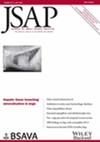High-dose induction therapy and treatment termination criteria for feline infectious peritonitis with remdesivir, GS-441524 and adjunctive mefloquine: 46 cases (2023)
Abstract
Objective
Feline infectious peritonitis can be treated with antiviral agents, such as remdesivir and GS-441524. Standard treatment duration is 12 weeks, but no criteria have been established for individualising the timing of treatment cessation based on specific case characteristics. This study aimed to investigate whether treatment cessation for feline infectious peritonitis could be determined using acute-phase proteins and albumin/globulin ratio and to evaluate whether treatment duration, following high-dose induction, could be safely shortened.
Materials and Methods
Forty-six cats with feline infectious peritonitis, excluding those with only ocular or neurological signs, were treated with a high initial dose (>20 mg/kg/day) of either injectable remdesivir or oral GS-441524. Surviving cats continued on a maintenance dose tailored to their clinical signs after initial improvements. Clinical signs, acute-phase protein levels, and albumin/globulin ratios were regularly monitored to assess when to end treatment. Cases where treatment was concluded in less than 12 weeks received supplementary mefloquine therapy.
Results
Among the 46 included cats, 42 (91.3%) achieved long-term survival, with 28 (66.7%) meeting the criteria for treatment cessation [median treatment duration, 57 days (range, 45 to 74 days)]. No recurrence was observed in any of the 42 cats, either during the treatment or within the 3-month follow-up period.
Clinical Significance
In some cats with feline infectious peritonitis a high-dose induction protocol, using acute-phase proteins and the albumin/globulin ratio for treatment cessation, enabled a shorter treatment period than the conventional 12 weeks, without observed recurrence. The criteria used in this study appear adequate for determining appropriate times for feline infectious peritonitis treatment cessation.

 求助内容:
求助内容: 应助结果提醒方式:
应助结果提醒方式:


